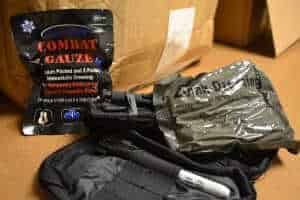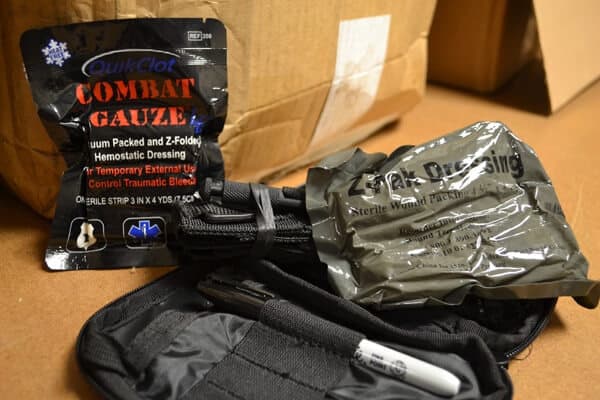A trauma kit—one of 192 issued to all Salem police officers last year—made all the difference to one man last December when Officer Kristy Fitzpatrick used the kit to save his life.
Fitzpatrick and two other officers were called to a motel room in North Salem following a report of a man attacking a woman there. “A man had broken into a lady’s room and had tried to force himself on her,” Fitzpatrick recalled. “She got away and called police.”
When the officers arrived, they encountered a bloody scene. They found a man in his late 50s or early 60s lying on the floor in the bathroom. A lamp had been knocked over and broken, and the man apparently had used shards of glass from the lamp to slice open his belly. There was blood all over.

While the other two officers restrained the man, Fitzpatrick went to work on the man’s abdomen.
“He was going into shock, and he had lost a lot of blood,” she said. “He was sweating, and he looked pale. He was going in and out of consciousness. Something had to be done.”
She grabbed her trauma kit and pulled out a high-compression bandage. She applied the bandage to the most serious cut—the one where the man’s intestines were popping out—and applied pressure to stop the blood flow and hold his guts inside. The bandage is as large as a small book, she said, so it could cover much more area than a typical Band-Aid.
“I wanted to keep him alert,” she said, “so I talked to him. I asked him about his favorite things and where he grew up. Sometimes I had to prod him.” She learned that he had done this self-mutilation twice before, once with an electric drill. This went on for one or two minutes until the medics arrived.
Fitzpatrick kept the pressure on the wound while the man was loaded into the ambulance. Then she was able to step away while the man was taken to the hospital. The man survived his attempted suicide.
Would the man have died if she hadn’t used the bandage on him? “Absolutely,” she said. “The trauma kit had given us the tools to take the steps to save his life.
“Anybody deserves a chance to live,” she said. That goes for law-breakers, too.
“I think that human life is precious,” she said. “I don’t care what he has done. I’m not the judge or jury. I’m going to do my best. I’m glad I was able to help.”
Obviously, that goes for police officers, too. “If one of us gets injured,” she said, “I want to have the ability to treat my partners.” The trauma kit provides that extra margin of protection.
It’s the same protection that soldiers and Marines have in combat. Fitzpatrick served 18 months on National Guard deployment in Iraq with the U.S. Army conducting convoy security, so she knows how thankful that troops are to have kits like these available.

“We had several officer-involved shootings in the last year,” Fitzpatrick said. “In one of the incidents, the first aid provided by officers to other officers in a remote location made the difference between life and death. During my own incident, I know that without the trauma kit, the citizen I provided first aid to would have died.
“Police are often the first people on scene, not medics or the fire departments. In my case, medics did not arrive for at least 10 minutes, 10 minutes in which the citizen would have bled out.
“The gift the community has afforded us, not just for fellow police officers, but the community’s citizens in general, is priceless. We as a department often express our gratitude of the community’s generosity amongst ourselves.”
The Salem police trauma kits cost almost $20,000, and all of that money was raised at Breakfast with the Chief, a 2013 fundraiser for the Salem Police Foundation. All those who contributed to the foundation at the event had a hand in saving this man’s life.



